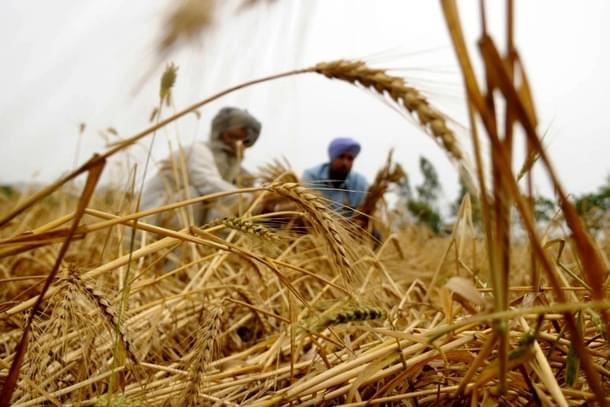Economy
Farmers’ Demand For MSP As A Legal Right Backed By Parliamentary Panel. What To Know And Expect
Swarajya Staff
Dec 21, 2024, 07:39 AM | Updated 07:39 AM IST
Save & read from anywhere!
Bookmark stories for easy access on any device or the Swarajya app.


The longstanding demand of farmers’ organisations for a legally guaranteed minimum support price (MSP) has roared back into focus.
The Standing Committee of Parliament on Agriculture, led by Congress leader and former Punjab chief minister Charanjit Singh Channi, has thrown its weight behind the demand, recommending legal status for MSP.
In a report tabled in Parliament on 17 December, the committee emphasised that implementing a legally binding MSP could address the alarming issue of farmers’ suicides and bolster agricultural resilience in India.
MSP is a crucial mechanism through which the government supports farmers by purchasing their crops at a pre-determined price. This price prevents farmers from market fluctuations and offers stability and income security.
MSP is announced annually for 23 crops, covering both the kharif and rabi seasons, well in advance of sowing, with 21 of them being food crops.
The responsibility for determining the MSP lies with the Commission for Agricultural Costs and Prices (CACP), established in 1965 as the Agricultural Prices Commission and rebranded in 1985.
The Cabinet Committee on Economic Affairs (CCEA), headed by the Prime Minister, takes the final call on MSPs.
Despite its importance, MSP currently lacks statutory backing, and no law mandates its enforcement. Government procurement under MSP is limited — approximately one-third of wheat and rice crops are purchased at these rates, with half of it coming from Punjab and Haryana alone, and only 10–20 per cent of select pulses and oilseeds.
A 2015 report by the Shanta Kumar Committee revealed that only 6 per cent of farm households sell wheat and rice to the government at MSP rates.
However, procurement levels have been rising in recent years, creating a ripple effect that helps boost the floor price in private markets, offering indirect benefits to farmers beyond those participating in direct government sales.
Why Has the Panel Recommended a Legal Guarantee?
Noting that MSP remains a focal point in the dialogue surrounding agricultural reform and farmers’ welfare in India, the committee reiterated that the benefits of implementing MSP as a legal guarantee far outweigh its challenges.
The panel stated that legal MSP will stimulate economic activity in farming areas, benefiting local businesses and economies. “With assured income through MSP, farmers are more likely to invest in their agricultural practices, leading to increased productivity and sustainability in farming,” the report said.
The committee also pointed out that legally guaranteeing MSP would help contribute to long-term food security for the nation by stabilising food grain production.
“Consistent income allows farmers to plan better and maintain production without the fear of market fluctuations undermining their efforts,” the panel said, recommending that the Centre declare a roadmap for implementing MSP as a legal guarantee at the earliest.
The Feasibility Debate: Can MSP be Legally Guaranteed?
The conversation around a legal guarantee for MSP boils down to whether such a policy is practically achievable. A legal guarantee would require binding provisions to ensure farmers receive MSP for all 23 crops when they sell them. But the debate is split.
Critics argue that guaranteeing MSP for all crops is economically unviable. In 2020, the combined value of crops under MSP was estimated at Rs 10 lakh crore, a significant portion of India’s total 2023–24 budget of Rs 45 lakh crore. Allocating this amount solely for crop procurement would strain the exchequer, leaving little room for other welfare and development initiatives.
Even considering that farmers retain about 25 per cent of their produce for personal use, a legal guarantee would still require a Rs 7.5 lakh crore provision, a staggering sum. Such expenditure, critics say, could derail broader economic priorities.
Is Converting MSP Into a Legal Guarantee a Bad Idea?
Not necessarily!
The feasibility of a legal MSP guarantee hinges on how it is implemented. Will the government allocate massive budgetary provisions, or will it adopt alternative measures to ensure fair prices for farmers?
One practical approach involves targeted intervention: the government can provide cash support when market prices fall below the MSP. Put simply, this means reimbursing farmers for the difference between the MSP and the actual price they receive — a far more manageable cost compared to blanket procurement.
Estimates suggest that such a mechanism would cost the government Rs 30,000-50,000 crore annually, a fraction of the Rs 7.5 lakh crore required for universal MSP enforcement.
A report by CRISIL Research pegs this cost even lower, at Rs 21,000 crore, for the agricultural marketing year (MY) 2023.
“Our calculations show it will need a working capital of around ₹6 lakh crore in MY 2023. The real cost to the government, though, will be the difference between MSP and mandi prices, which works out to around ₹21,000 crore for MY2023,” the research noted.
CRISIL factored in 16 of 23 crops, accounting for over 90 per cent of field crop production, in its analysis.
Moreover, as noted economist Ajit Ranade points out, government procurement triggers a market response: prices start climbing once the state steps in, reducing the need for indefinite intervention.
A Stumbling Block or a Step Forward?
Government intervention, especially in the form of a legally binding MSP, is often painted as a problem. But this narrative stems from an unyielding faith in free-market principles, which continues to hinder a fair resolution to the ongoing crisis in farmers’ incomes.
Recently, Vice President Jagdeep Dhankhar dismissed fears that MSP would drive inflation. “Whatever price we give to the farmer, the nation will benefit five times over. There is no doubt about it,” he stated.
That said, whether the government will act on the Standing Committee’s call for a legal MSP remains uncertain.
While both the Prime Minister and the Agriculture Minister have repeatedly assured Parliament that the MSP regime is here to stay, they have resisted calls for statutory backing.
A policy paper by NITI Aayog’s agricultural economist Ramesh Chand, often cited by officials, argues that price levels unsupported by demand and supply cannot be sustained through legal means. It proposes that states are free to implement MSP guarantees but highlights the pitfalls of such attempts.
As the debate rages on, one thing is clear: ignoring the issue is no longer an option.





